10 Benefits of Data Management Consulting for Market Analysts

10 Benefits of Data Management Consulting for Market Analysts
Overview
The article outlines ten benefits of data management consulting for market analysts, emphasizing its critical role in enhancing decision-making, operational efficiency, and competitive advantage. By leveraging high-quality datasets and tailored strategies, analysts can improve data-driven insights, optimize business processes, and ensure compliance. This ultimately leads to more informed decisions and better organizational outcomes.
What specific advantages can data management consulting bring to market analysts?
- It provides access to superior datasets, which enhances the quality of insights derived.
- It streamlines operations, allowing analysts to focus on strategic initiatives rather than data management tasks.
- It fosters compliance with industry regulations, minimizing risks associated with data handling.
In conclusion, the strategic application of data management consulting not only empowers analysts but also drives overall business success. By embracing these benefits, organizations can position themselves more effectively in the marketplace.
Introduction
Data has become the lifeblood of modern business, driving decisions and shaping strategies across industries. For market analysts, the ability to harness quality data through effective management consulting can lead to transformative insights and operational efficiencies. However, the question remains: how can organizations fully leverage these data management practices to enhance their decision-making processes and gain a competitive edge in an increasingly data-driven landscape? This article explores ten compelling benefits of data management consulting, revealing how it empowers analysts to navigate complexities and seize opportunities.
Initial Data Offering: Streamline Access to Quality Datasets
The Initial Data Offering (IDO) functions as a vital centralized hub that connects purchasers and vendors, significantly simplifying the process for industry experts to discover and utilize high-quality datasets. By meticulously selecting unique datasets from various domains, IDO not only enhances the visibility of valuable resources but also ensures their accessibility—an essential element for informed decision-making in analysis. This streamlined access enables analysts to focus on deriving actionable insights rather than wasting valuable time searching for information.
As Geoffrey Moore asserts, "information is absolutely crucial to making smart business decisions," underscoring the importance of high-quality datasets for effective market analysis. Furthermore, with companies losing $5.2 million in income due to unexploited information, the financial ramifications of utilizing quality datasets become apparent. This emphasizes the significance of platforms like IDO, which empower experts to respond swiftly to emerging trends and utilize data management consulting to make data-informed decisions that can yield competitive advantages.
Additionally, IDO offers daily updates on fresh dataset findings, allowing researchers to subscribe for premium access to exclusive data collections. This feature further enhances their ability to stay ahead in the rapidly evolving business landscape. How can your organization leverage these insights to improve decision-making? By tapping into the resources provided by IDO, professionals can ensure they are equipped with the necessary information to navigate their industries effectively.
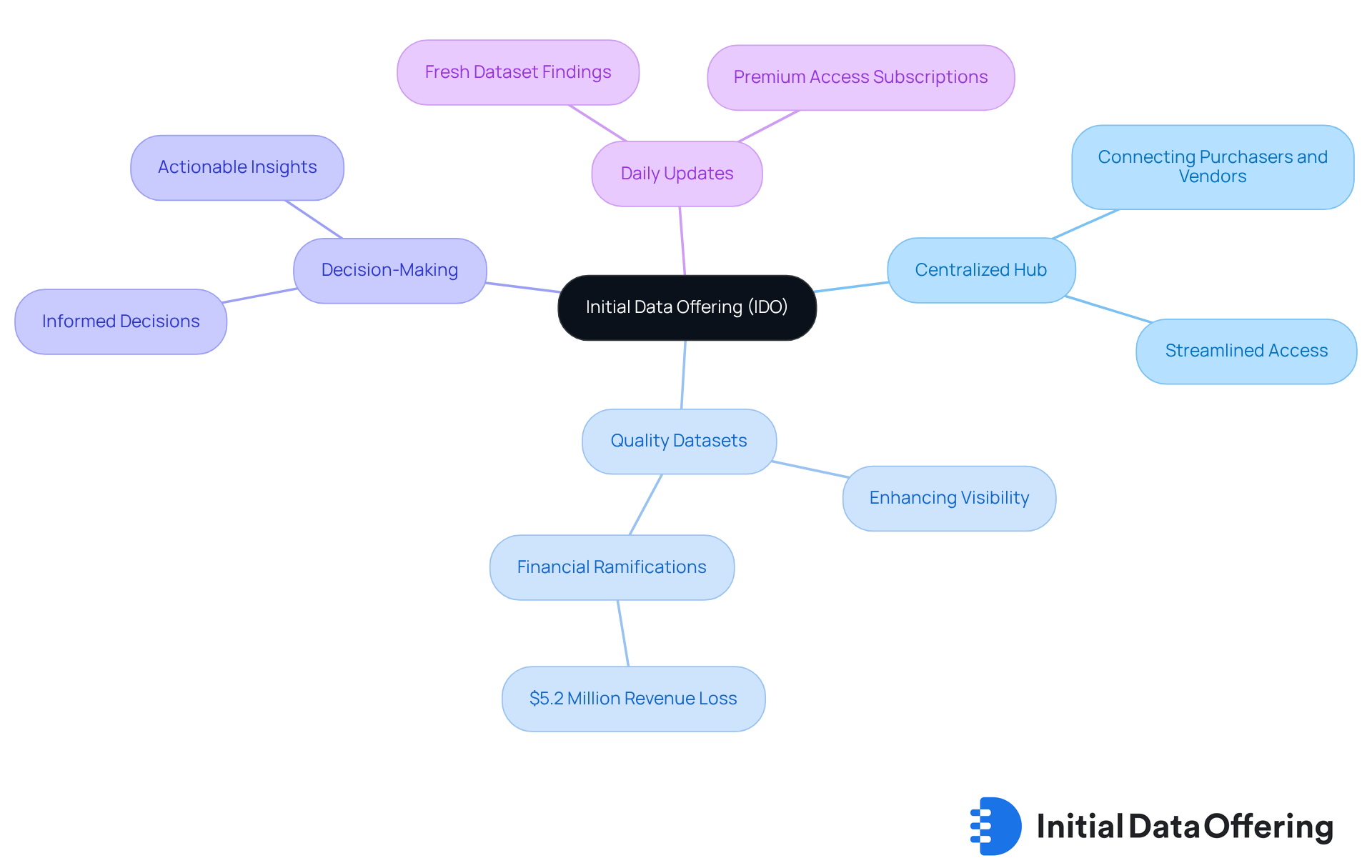
Enhanced Decision-Making: Utilize Data-Driven Insights
Data-driven insights empower industry experts to make informed choices grounded in empirical evidence rather than mere intuition. By leveraging datasets available through platforms such as IDO, analysts can uncover trends, consumer behaviors, and economic dynamics that significantly inform their strategies. This data-centric approach enhances decision accuracy and ensures alignment with actual market conditions, ultimately leading to improved outcomes.
For example, organizations that effectively implement analytics capabilities report a remarkable 127% return on investment (ROI) within three years, illustrating the financial advantages of adopting data-driven strategies. Furthermore, 64% of marketing executives strongly agree that data-driven marketing is crucial in today's environment, underscoring the necessity for researchers to incorporate empirical evidence into their strategic development.
As the analytics sector evolves, the integration of AI and real-time information gathering is transforming how market researchers conduct their tasks. This advancement allows them to respond swiftly to shifting market conditions and consumer demands. However, challenges such as information gathering, management, privacy, analysis, and organizational acceptance remain significant barriers that researchers must navigate. How can professionals leverage these insights to overcome such obstacles and enhance their strategies?
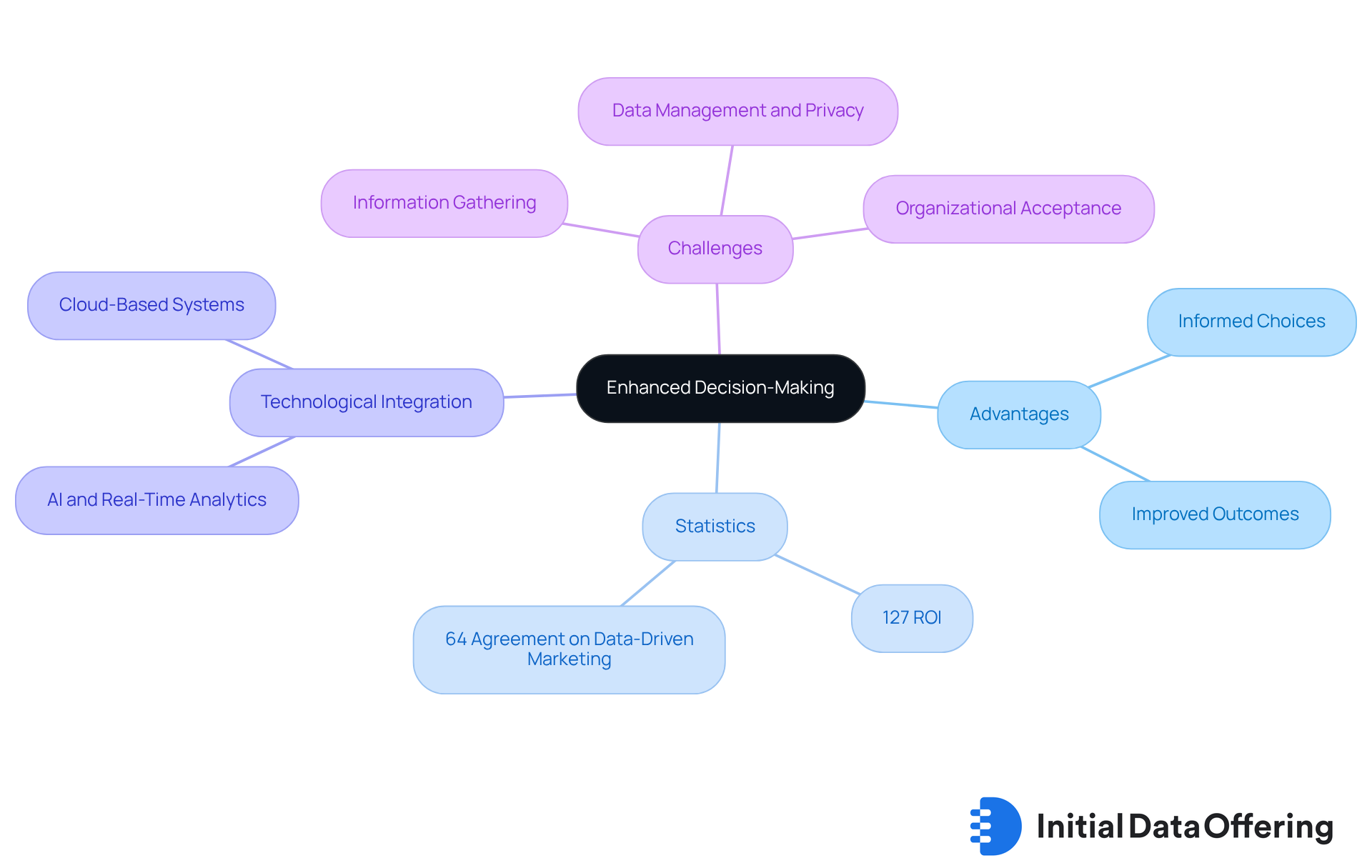
Operational Efficiency: Optimize Business Processes with Data
Data management consulting is essential for assisting entities in identifying inefficiencies and applying data-driven solutions that improve operations. By utilizing sophisticated analytics, analysts can pinpoint bottlenecks and areas ready for enhancement, which results in optimized workflows and heightened productivity. This focus on operational efficiency not only leads to cost reductions but also enables entities to adapt more swiftly to market fluctuations.
For instance, companies like General Motors have improved their customer interactions through AI-driven solutions, significantly enhancing service efficiency by identifying and addressing inefficiencies in their processes. Similarly, organizations employing business intelligence tools have reported enhancements in operational efficiency of up to 80%. This highlights the transformative impact of analytics.
As industry specialists point out, effective information analysis is essential for identifying inefficiencies. Gil Peleg emphasizes that extracting historical information can provide significant value, enabling companies to create predictive models that foresee customer needs and enhance operations. With the global large-scale analytics market valued at $271.83 billion in 2022, the trend toward information-driven decision-making is expected to expand. In fact, 65% of companies are projected to transition to information-centric strategies by 2026, underscoring the increasing reliance on data management consulting to facilitate this shift.
In 2025, the incorporation of information analytics into business processes will be crucial. Companies will increasingly depend on insights to improve their operational capabilities and sustain a competitive advantage.
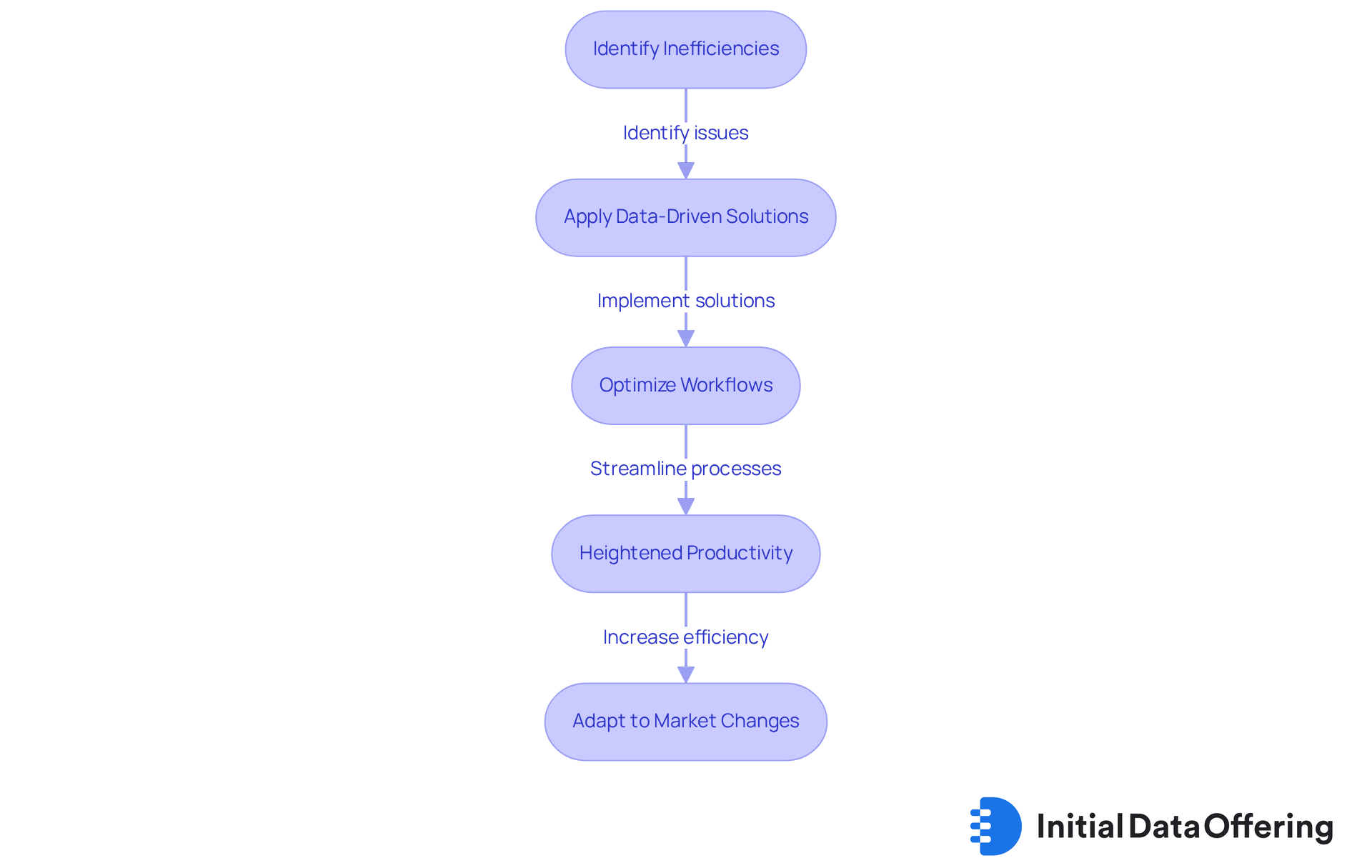
Competitive Advantage: Leverage Data for Market Leadership
Organizations that skillfully utilize information can obtain a significant competitive edge in their industries. By harnessing insights from comprehensive datasets, industry analysts can pinpoint emerging trends, gauge consumer preferences, and make informed strategic decisions that elevate their organizations to leadership positions. This proactive method of utilizing information not only allows businesses to stay ahead of rivals but also prepares them to quickly adjust to changing market dynamics.
For instance, companies utilizing predictive analytics have reported an average profit increase of 8% and a 10% reduction in costs, showcasing the tangible benefits of data-driven strategies. Additionally, although 91% of companies acknowledge the essential role of information-driven decision-making in their success, merely 57% assert they ground their business choices on information, emphasizing a notable opportunity for enhancement. As entities prioritize information governance and quality, 60% of information leaders highlight the significance of data management consulting for effective management, enabling them to unlock the full potential of their assets.
This fosters a culture of informed decision-making that drives growth and innovation. A significant example is Red Roof Inn, which employed analytics to pinpoint marketing opportunities, leading to a 10% rise in turnover. How can your organization leverage similar data-driven strategies to enhance decision-making and drive growth?
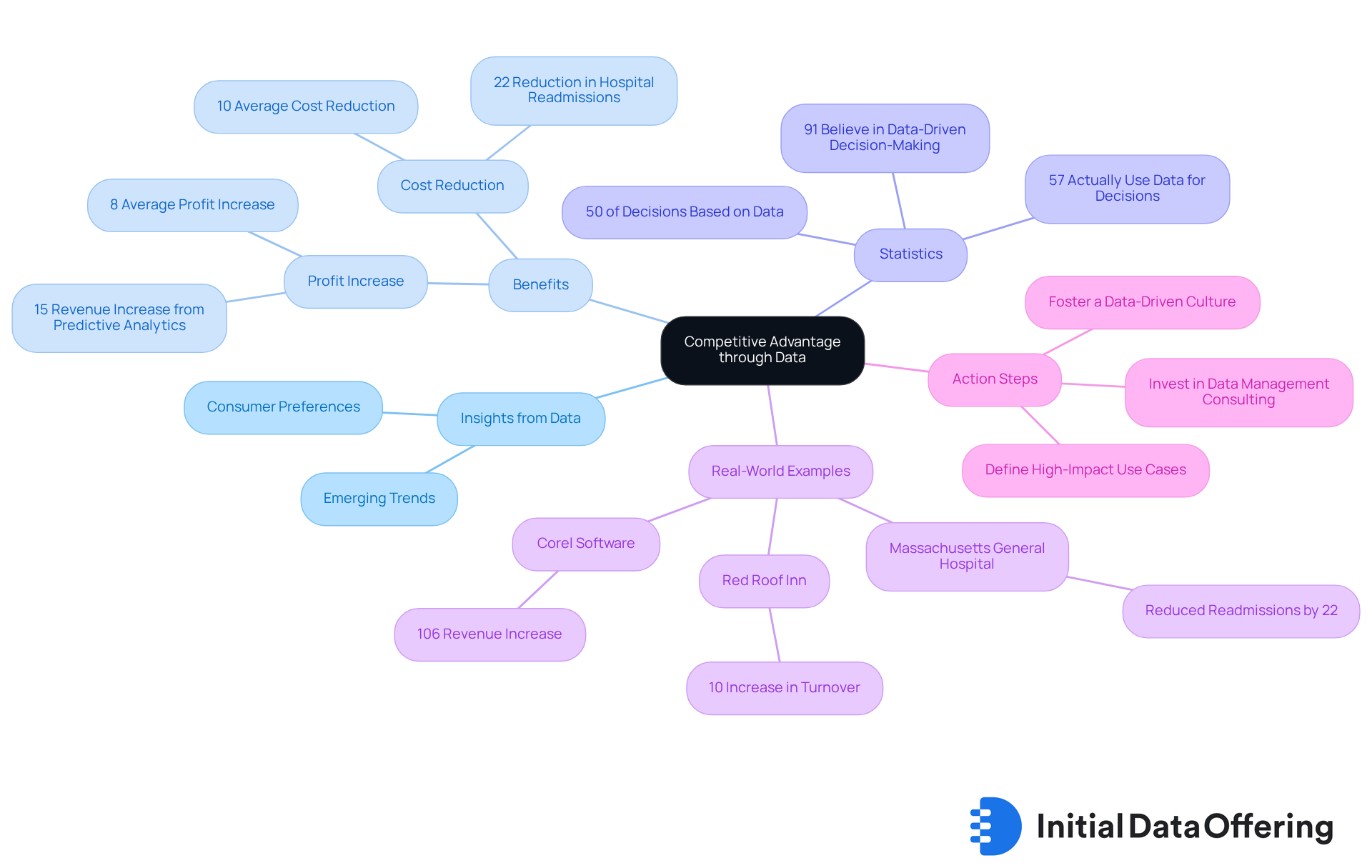
Risk Management: Identify and Mitigate Data-Related Risks
Effective risk management is crucial for organizations that depend on information for decision-making. By identifying potential information-related risks, such as breaches or inaccuracies, market analysts can implement strategies to reduce these risks. This proactive approach not only safeguards sensitive information but also ensures that the information used for analysis is reliable and credible. Ultimately, this fosters improved decision-making, enabling organizations to navigate challenges more effectively.
Consider the features of effective risk management: it involves thorough assessment and mitigation of information-related risks. The advantages are clear; organizations can protect their data integrity and enhance their analytical capabilities. The benefits extend beyond mere compliance; they lead to more informed and confident decision-making, which is essential in today’s fast-paced environment.
How can your organization implement these strategies? By prioritizing risk management, you can create a framework that supports accurate analysis and informed decisions. This not only builds trust with stakeholders but also positions your organization for long-term success.
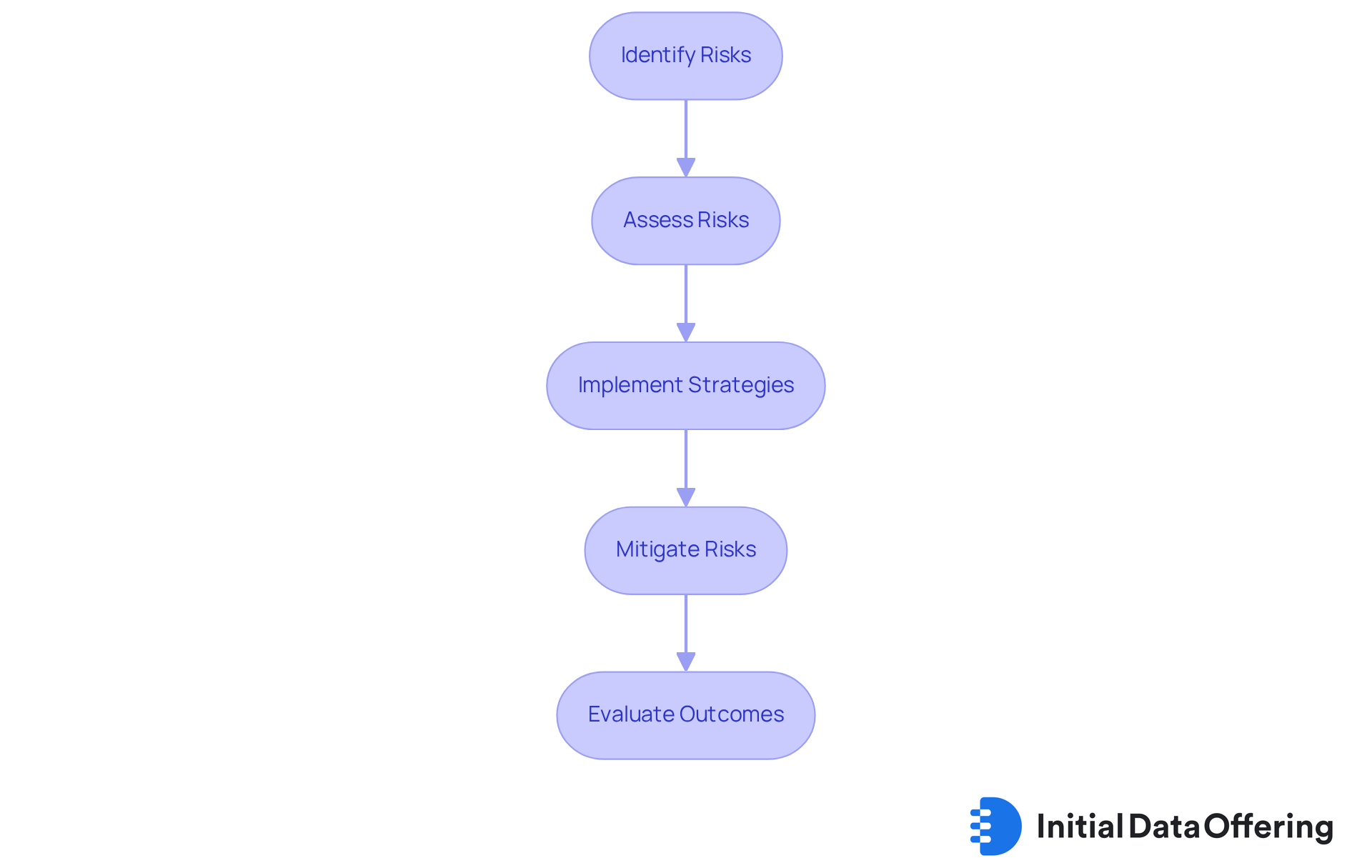
Customized Solutions: Tailor Data Strategies for Unique Needs
Tailored information strategies empower organizations to address their unique challenges and goals effectively. By collaborating with data management consulting experts, market analysts can develop solutions that are specifically designed to meet their operational needs. This customization ensures that the information collected and analyzed is not only relevant but also actionable, thereby enhancing decision-making and strategic planning.
Current trends reveal a growing emphasis on personalization within information management. Notably, 89% of digital businesses are investing in customized solutions to improve customer experiences. This trend underscores the necessity for analysts to adapt to a landscape where data management consulting is crucial as information teams face reduced budgets and must prioritize high-impact projects.
As Kevin Lobo, VP of Consulting, notes, "2025 will require that information teams accomplish more with fewer resources — it’s about targeted investment, not merely reducing." This statement highlights the importance of ensuring that information strategies are both efficient and effective, enabling organizations to navigate the complexities of today's market.
In what ways can your organization leverage tailored information strategies to enhance decision-making? Consider the implications of these trends and how they might influence your approach to information management.
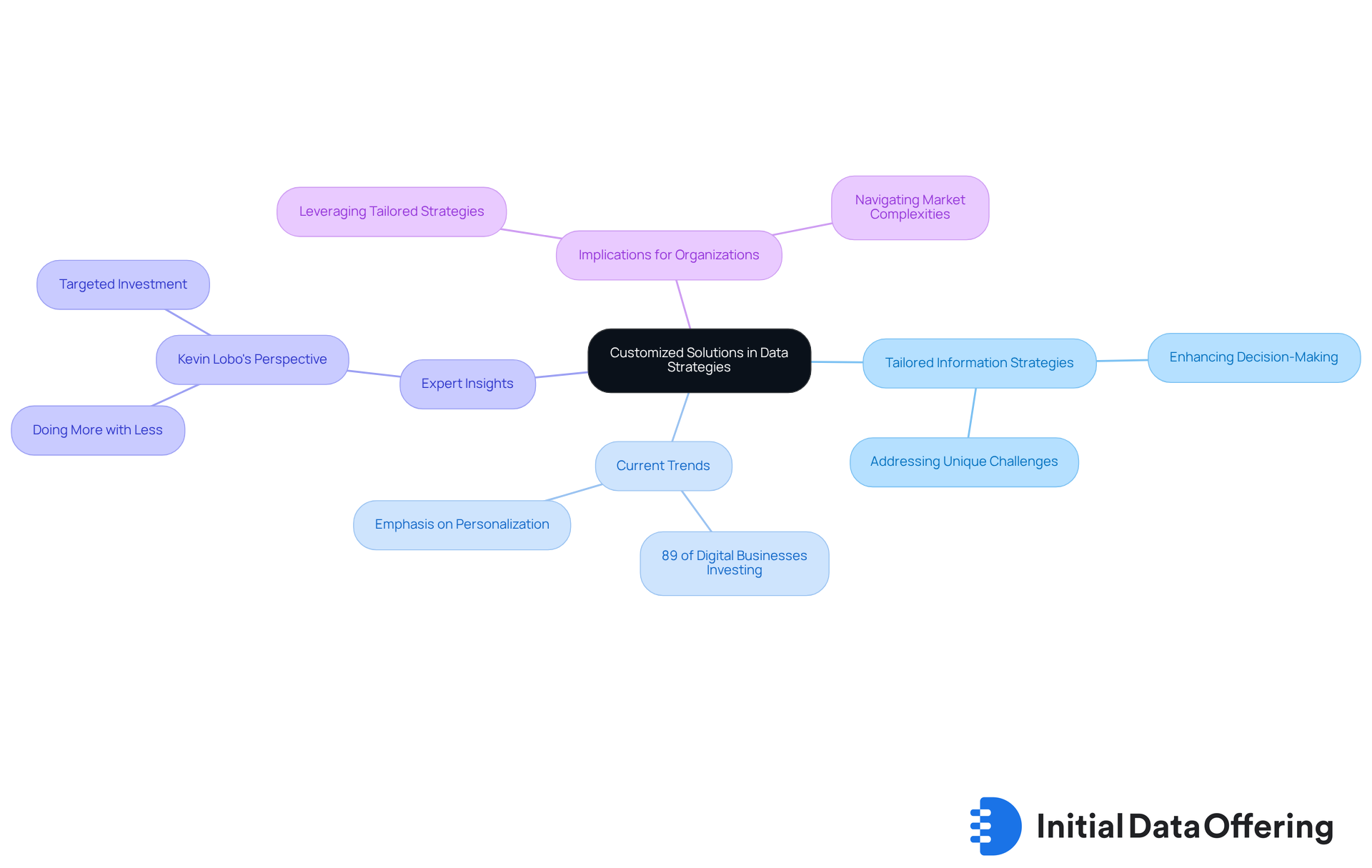
Compliance Assurance: Navigate Regulatory Requirements with Confidence
Compliance assurance serves as a crucial feature of information management, especially in industries governed by strict regulations. Market analysts face the challenge of navigating a complex landscape of regulatory requirements to ensure their practices align with compliance standards. By adopting robust data governance frameworks, organizations not only enhance their compliance efforts but also utilize data management consulting to leverage data for insightful decision-making. This proactive approach not only mitigates potential legal risks but also fosters a stronger reputation within the industry.
How can companies ensure they are effectively managing compliance? The implementation of comprehensive data management consulting strategies allows organizations to maintain oversight and control over their data practices. This not only safeguards against legal challenges but also positions them favorably in a competitive market. The benefits of a well-structured compliance assurance program are clear:
- Enhanced trust from stakeholders
- Improved operational efficiency
- A solid foundation for informed business decisions
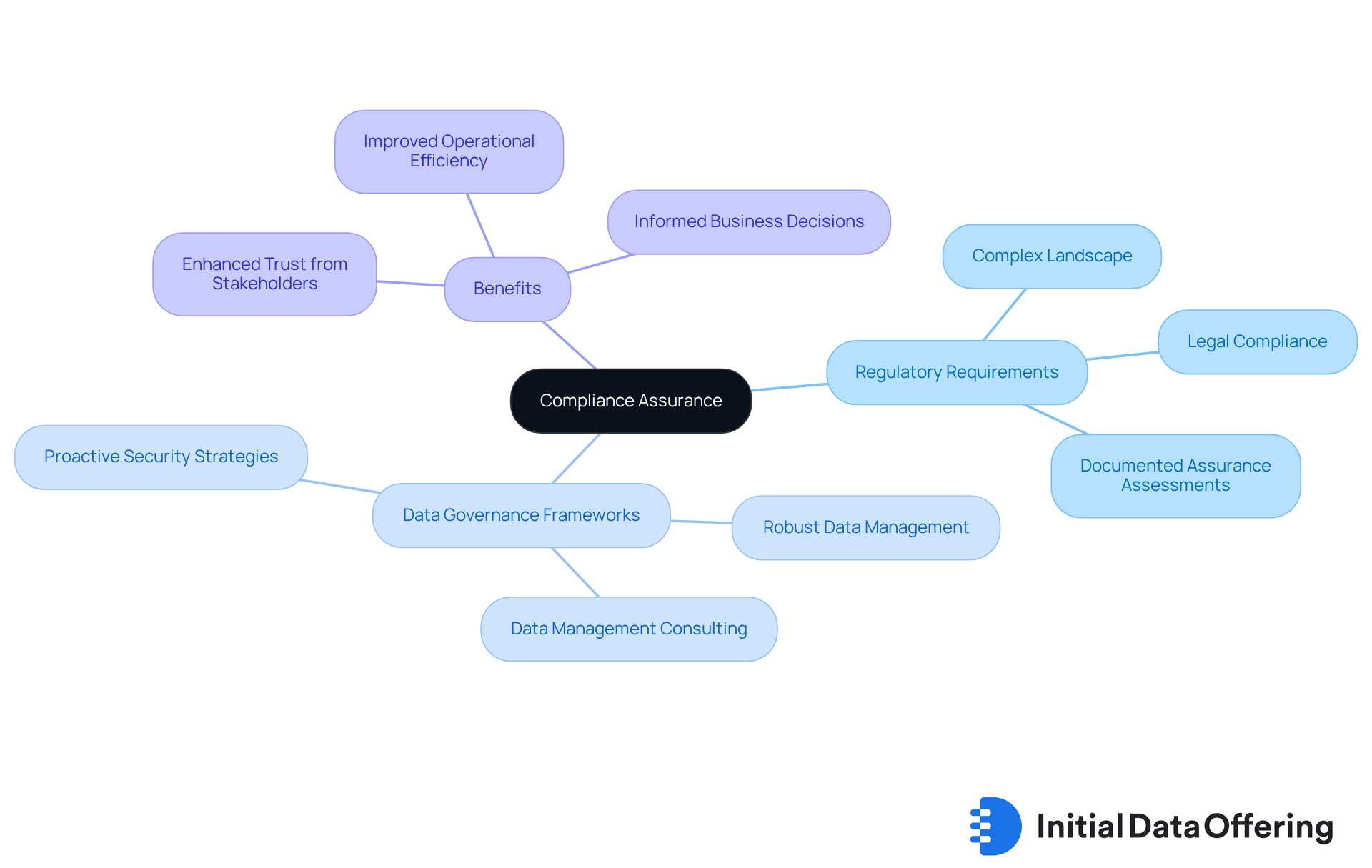
Innovation Facilitation: Drive New Product Development with Data
Data plays a pivotal role in driving innovation and new product development. By examining industry trends and customer feedback, analysts can identify gaps in the sector and opportunities for new products. This data management consulting approach accelerates the development process and ensures that new offerings align with consumer needs and preferences, ultimately leading to successful product launches.
For instance, a producer that employed analytics to pinpoint production bottlenecks attained a throughput rise from 75% to 90%, as illustrated in the case study named 'Increased Efficiency in Production Line.' Moreover, predictive analytics has proven essential in anticipating product demand, enabling companies to synchronize their product launches with readiness in the industry. As Uthayasankar Sivarajah, a Professor of Technology Management, noted, "Data analysis is not just about numbers; it's about understanding the story behind those numbers to drive innovation."
This approach leads to successful product launches, as evidenced by case studies where data-driven strategies have resulted in reduced production waste and enhanced customer satisfaction. By adopting information analysis and data management consulting, product researchers can efficiently manage the intricacies of product development, guaranteeing that their approaches are knowledgeable, prompt, and in tune with prevailing industry trends.
Furthermore, the revolutionary capacity of information assessment in manufacturing emphasizes its importance across diverse sectors, reinforcing the necessity for industry evaluators to utilize these insights. How can your organization leverage data analysis to improve product outcomes? The implications are profound, suggesting that a commitment to data-driven strategies is essential for sustained success in today's competitive landscape.
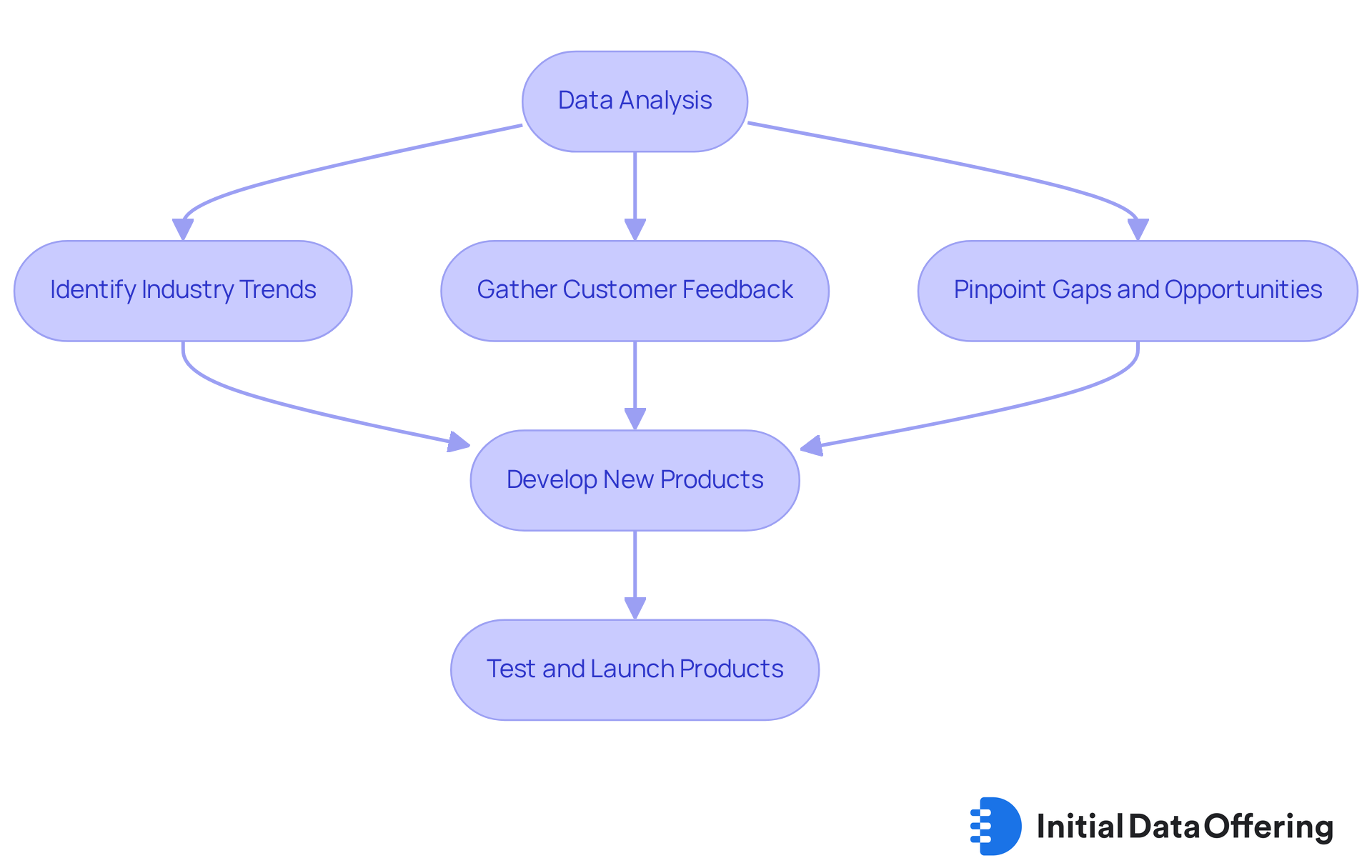
Data Quality Improvement: Ensure Accurate and Reliable Data
Ensuring high information quality is essential for market analysts who rely on accurate details for their analyses. Organizations that utilize data management consulting can significantly enhance the accuracy, completeness, and reliability of their datasets. Regular audits and information cleansing are essential strategies that assist in upholding high standards over time, as demonstrated by companies that have effectively incorporated these practices into their operations. By concentrating on information quality, organizations can utilize data management consulting to enhance the credibility of the insights obtained from their information and support informed decision-making across all levels.
Current trends indicate a growing emphasis on automated quality tools, such as Pandas, Talend, and Alteryx, which can detect anomalies and standardize formats, thereby enhancing reliability. Industry leaders advocate for a strategic, organization-wide approach to information quality, emphasizing that every employee, from analysts to front-line staff, should understand their role in preserving it. This collective responsibility fosters a culture of accountability and continuous improvement, which is crucial in today’s data management consulting landscape.
Furthermore, the significance of information accuracy cannot be overstated for market analysts, as it directly affects their capacity to derive actionable insights and make strategic recommendations. Organizations that prioritize data quality often seek data management consulting to mitigate risks associated with poor data, which costs an average of $12.9 million annually, and to position themselves to leverage data as a critical asset for operational advantage. How can your organization enhance its data quality practices to drive better decision-making?
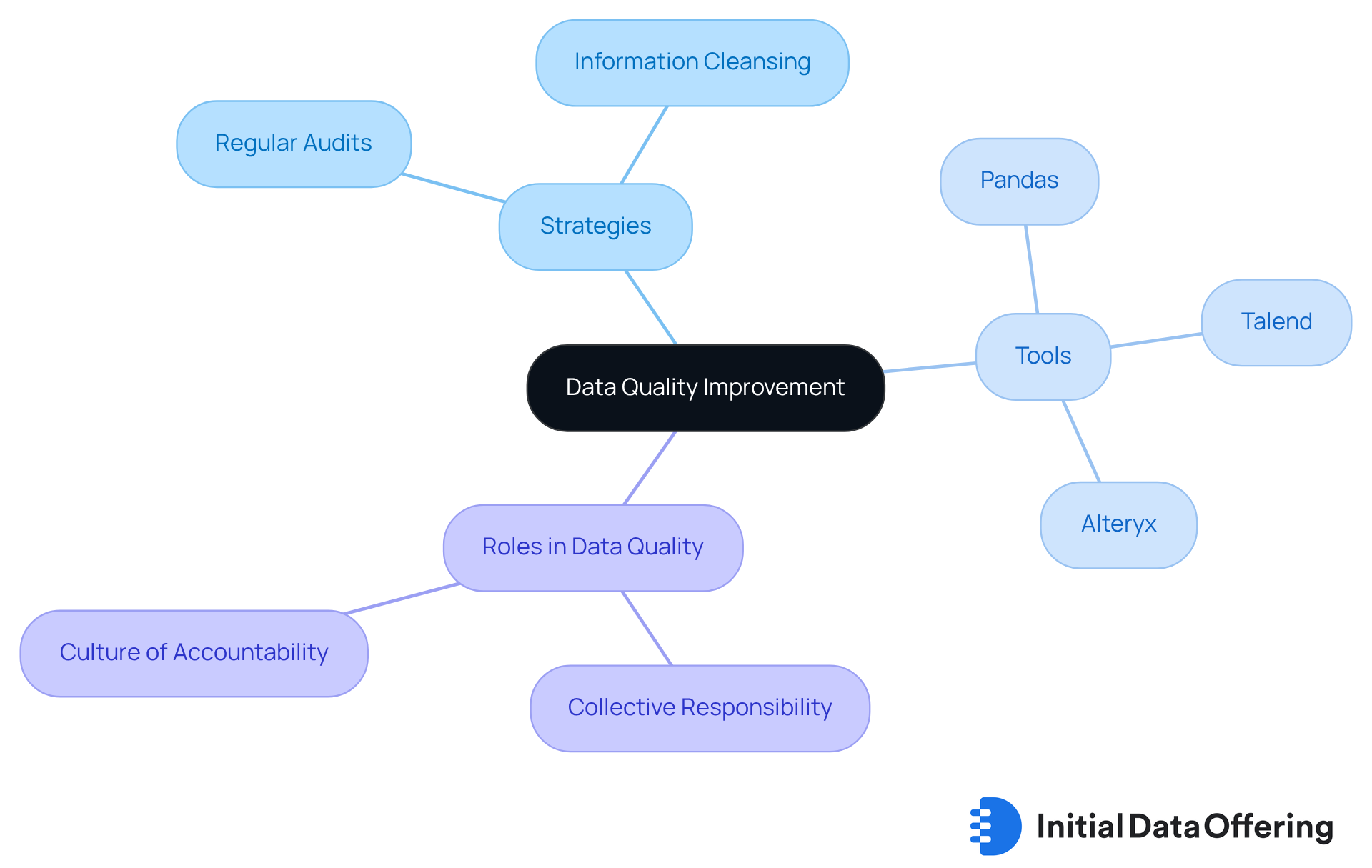
Collaboration Enhancement: Foster Teamwork Through Data Insights
Data management consulting highlights the crucial role that data insights play in improving collaboration among teams within a company. By sharing data-informed insights, industry experts can foster a culture of collaboration and joint problem-solving. This collaborative approach enhances communication across departments and ensures that all teams are aligned in their strategies and objectives, ultimately driving superior business outcomes.
Current trends suggest that organizations leveraging data management consulting utilize insights to experience heightened engagement and productivity, as teams employ shared information to make informed decisions. For instance, companies that implement robust data-sharing practices report a significant improvement in project outcomes and innovation rates. As noted by industry analysts, fostering teamwork through data management consulting and data-driven insights is essential for navigating complex market challenges and achieving strategic goals. The incorporation of information into team dynamics streamlines workflows and enables employees to contribute meaningfully to organizational success.
However, challenges persist; only 19% of C-level executives report revenue increases of more than 5% from AI investments, emphasizing the difficulties firms encounter in effectively utilizing information. Additionally, 87% of executives anticipate revenue growth from AI over the next three years, reflecting strong confidence in the potential of information insights. A case study on AI-Powered Features of Meeting Insights illustrates how organizations are using data management consulting to enhance collaboration, showcasing the tangible benefits of data-driven teamwork.
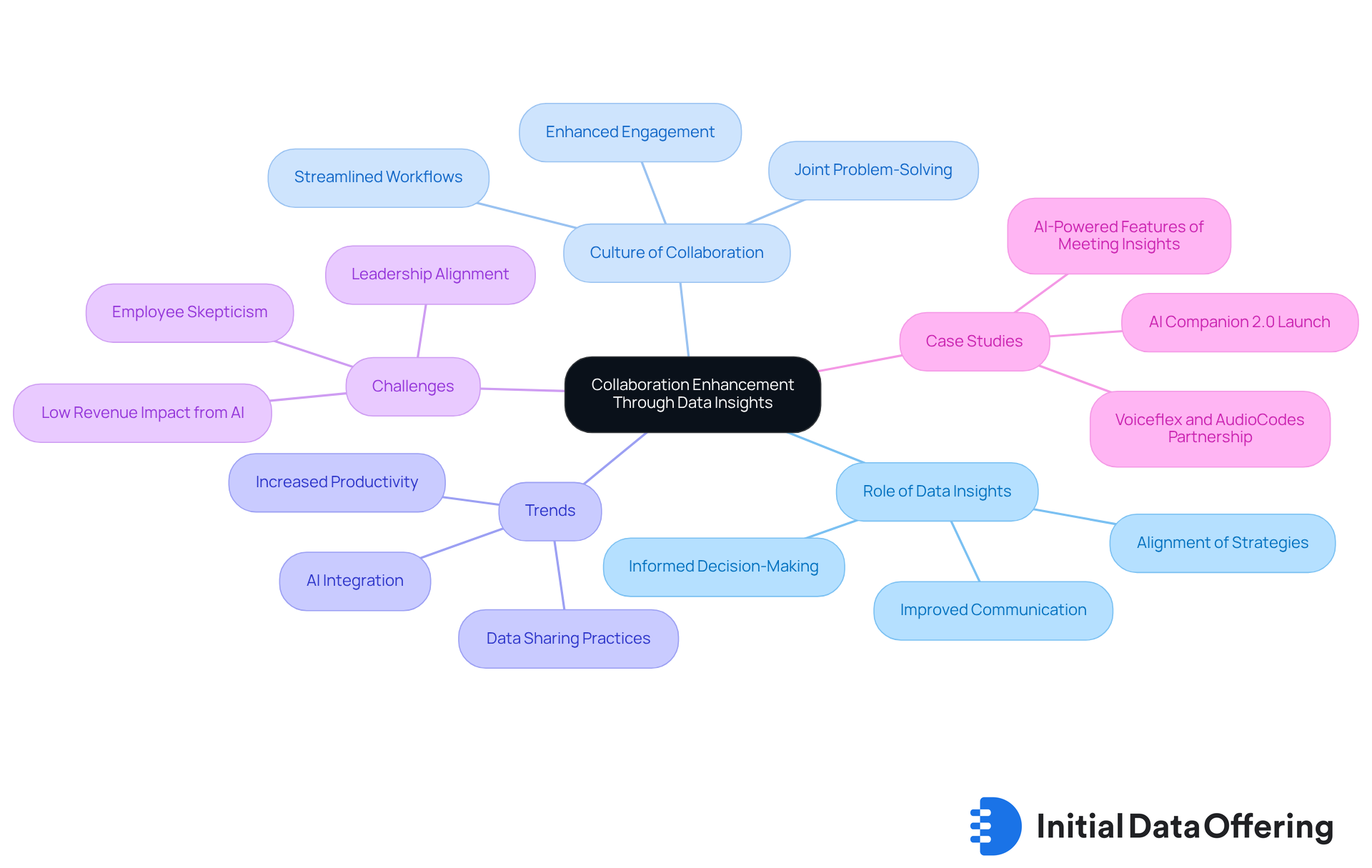
Conclusion
Data management consulting presents numerous advantages for market analysts, underscoring the vital role of quality data in enhancing decision-making, operational efficiency, and competitive positioning. By leveraging tailored data strategies and embracing innovative practices, organizations can effectively navigate complex market dynamics, ensuring they remain leaders in their respective industries.
Throughout this discussion, key insights have demonstrated how the Initial Data Offering (IDO) streamlines access to quality datasets, empowering analysts to extract actionable insights. The significance of data-driven decision-making has been emphasized, highlighting the financial benefits and improved strategic outcomes that result from adopting a data-centric approach. Furthermore, the necessity for robust risk management, compliance assurance, and enhanced data quality has emerged as essential components for fostering trust and reliability in data practices.
In conclusion, embracing data management consulting is not merely an operational choice; it is a strategic imperative for organizations seeking to thrive in today’s competitive landscape. By prioritizing data quality, optimizing processes, and fostering collaboration through insights, businesses can unlock the full potential of their data assets. This commitment to informed decision-making will not only drive innovation and growth but also establish a resilient foundation for long-term success.
How can your organization harness these insights to elevate its data strategy and ensure sustained competitive advantage?
Frequently Asked Questions
What is the Initial Data Offering (IDO)?
The Initial Data Offering (IDO) is a centralized hub that connects purchasers and vendors, simplifying the process for industry experts to discover and utilize high-quality datasets from various domains.
How does IDO enhance access to datasets?
IDO meticulously selects unique datasets, improving their visibility and accessibility, which is essential for informed decision-making in analysis.
Why is access to quality datasets important?
Access to quality datasets is crucial because companies can lose significant income due to unexploited information, highlighting the financial importance of utilizing quality datasets for effective market analysis.
What features does IDO offer to users?
IDO provides daily updates on fresh dataset findings and allows researchers to subscribe for premium access to exclusive data collections, enhancing their ability to stay ahead in the business landscape.
How do data-driven insights improve decision-making?
Data-driven insights empower industry experts to make informed choices based on empirical evidence, uncovering trends and consumer behaviors that inform strategies and enhance decision accuracy.
What financial benefits come from implementing data-driven strategies?
Organizations that effectively implement analytics capabilities report a 127% return on investment (ROI) within three years, illustrating the financial advantages of adopting data-driven strategies.
What challenges do researchers face in utilizing data?
Researchers encounter challenges such as information gathering, management, privacy, analysis, and organizational acceptance, which can hinder their ability to leverage data effectively.
How can organizations optimize their business processes with data?
Data management consulting helps organizations identify inefficiencies and apply data-driven solutions to improve operations, leading to optimized workflows and increased productivity.
What impact does analytics have on operational efficiency?
Companies using analytics have reported enhancements in operational efficiency of up to 80%, enabling them to adapt more swiftly to market fluctuations and improve customer interactions.
What is the projected trend for companies regarding information-centric strategies?
By 2026, it is projected that 65% of companies will transition to information-centric strategies, emphasizing the growing reliance on data management consulting to facilitate this shift.